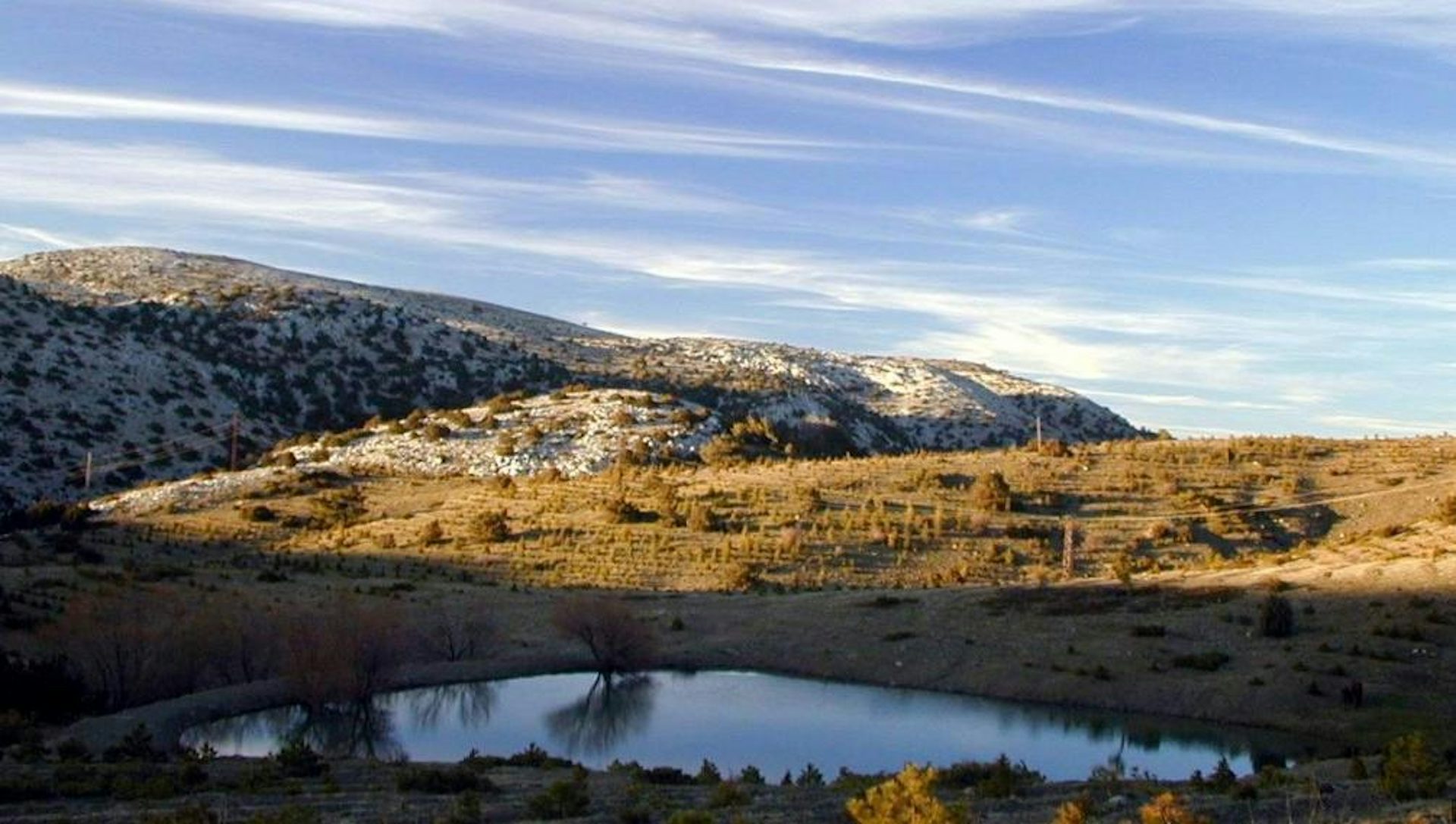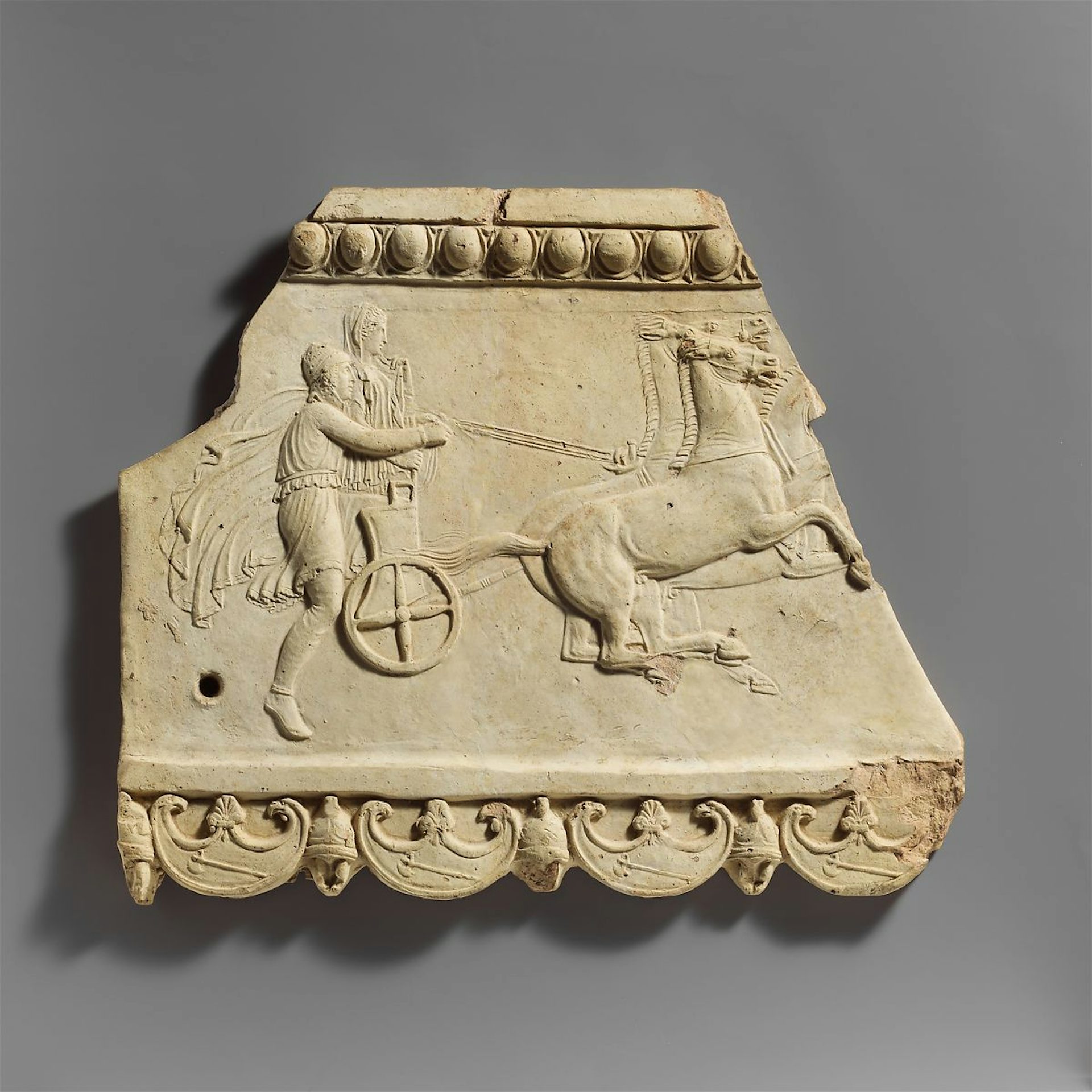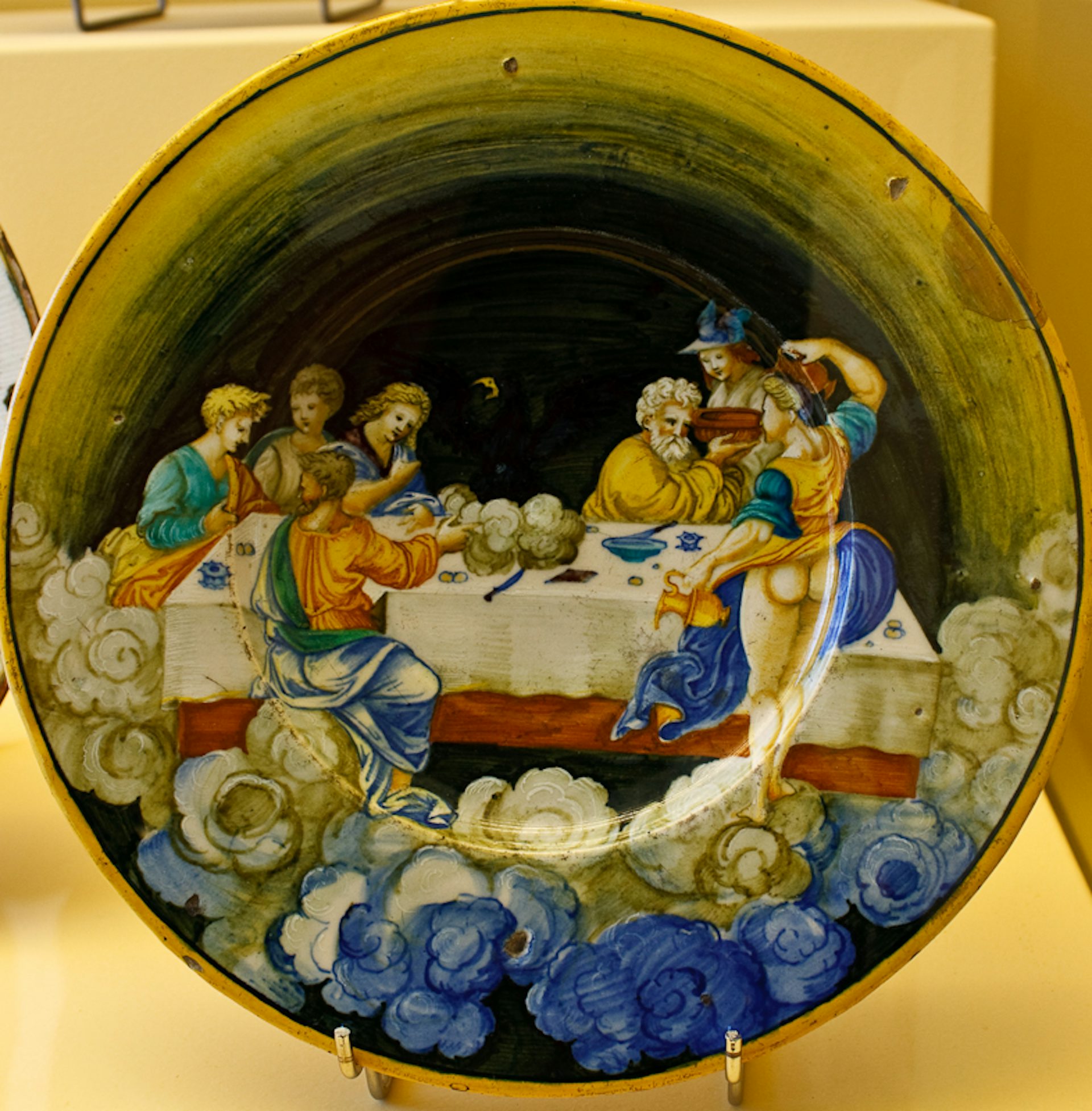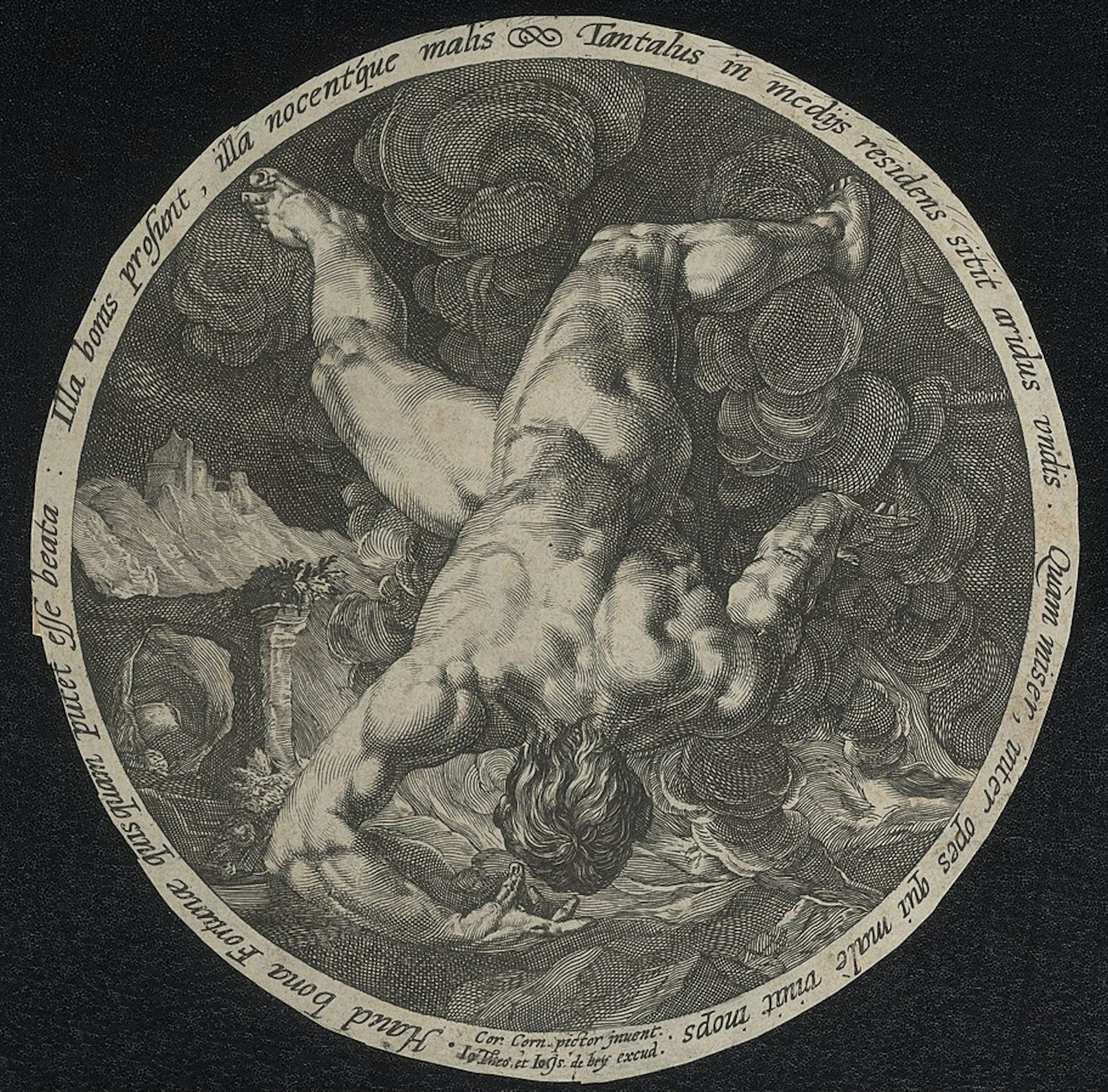Tantalus
Overview
Tantalus, the son of the nymph Pluto and either Zeus or Tmolus, was a king, usually said to have ruled somewhere in Anatolia. For many years, Tantalus enjoyed the gods’ favor. He was even invited to dine with them—an honor extended to few other mortals.
But Tantalus eventually did something to gravely offend the gods, either betraying their trust, stealing from them, or trying to feed them his son Pelops (there are different versions). For his hubris, he received eternal punishment in Tartarus, the dark region of the Underworld reserved for the most terrible sinners. In the common tradition, Tantalus was cast into a pool of water surrounded by fruit trees: whenever he tried to drink from the pool, however, the water receded, and whenever he reached for fruit, the branches withdrew.
Etymology
Ever since antiquity, the name “Tantalus” (Greek Τάνταλος, translit. Tántalos) has been connected with the Greek words τάλας (tálas, “wretched, unhappy”), ταλάσσαι (talássai, “to endure”), and τάλαντα (tálanta, “scale, balance; weight”)—words that are in turn related to the Indo-European root *telh₂-. The philosopher Plato, for example, translated Tantalus’ name as “he who has much to bear.”[1] Rather uncharacteristically, this interpretation is considered plausible by modern scholars.[2]
Pronunciation
English
Greek
Tantalus Τάνταλος (translit. Tántalos) Phonetic
IPA
TAN-tl-uhs] /ˈtæn tl əs/
Attributes, Kingdom, and Iconography
Tantalus was a king, though ancient sources disagreed on the location of his kingdom. Most claimed that he ruled somewhere in Anatolia (modern-day Turkey), variously locating his kingdom in the region of Lydia,[3] Mount Sipylus,[4] Phrygia,[5] or Paphlagonia.[6] Some authors, however, made Tantalus the king of a city in Greece, such as Argos[7] or Corinth.[8]

Mount Sipylus, sometimes said to have been the ancient kingdom of Tantalus (modern Manisa, Turkey).
Mr. V. YukselCC BY-SA 3.0Wherever he ruled, Tantalus enjoyed great prosperity for a time, not to mention the favor of the gods—until his hubris earned him a special place in hell (more or less literally).
Tantalus was best known for his punishment in Tartarus. In ancient literature and art, he tended to be grouped with Tartarus’ other famous permanent residents, including Sisyphus, Ixion, and Tityus. Tantalus’ punishment varied somewhat in the ancient sources, but it usually involved the sinner floating in a pool whose water he couldn’t drink and surrounded by trees whose fruit he couldn't eat.
Tantalus’ punishment was an occasional subject for painters, potters, and sculptors. Since he was usually regarded as an Anatolian king, artists sometimes represented him wearing the distinctive and elaborate costume associated with the region.[9]
Family
Tantalus’ father was either Zeus, the supreme Greek god,[10] or Tmolus, a minor mountain god[11] (depending on the source). His mother, according to all sources, was a nymph called Pluto.
Family Tree
Mythology
Origins
Tantalus is arguably the best representation of a mortal’s fall from divine favor. As one of the first mortals and a son of two gods (their identities vary across different sources), Tantalus enjoyed an intimate relationship with the most powerful beings in the cosmos. He was even invited to dine with the Olympian gods. Tantalus was also a wealthy king, with a wife who, like him, was usually said to have had divine parents and who gave him three impressive children.
But Tantalus, in the evocative words of the poet Pindar, “was not able to digest his great prosperity.”[18] For whatever reason, he decided to test or defy the gods; consequently, he received a terrible punishment.
Provoking the Gods: Five Versions of Tantalus
Different traditions circulated in antiquity about the exact nature of Tantalus’ crime, as well as his punishment.
The Cooking of Pelops
In what is probably the most common version, Tantalus decided to test the extent of the gods’ omniscience. He killed his son Pelops, cooked him, and served him to the gods as a meal, hoping to see if the gods would realize that they were being served human flesh.
In the familiar account, only Demeter ate from the unholy meal (she was distracted by her grief over the abduction of her daughter Persephone). But, unfortunately for Tantalus, the other gods immediately realized what he had done. They resurrected Pelops (the portion Demeter had eaten—part of his arm or shoulder—was replaced with ivory), while Tantalus was cast into Tartarus.[19]

Terracotta plaque showing Tantalus' son Pelops with his bride Hippodamia (27 BCE–68 CE).
Metropolitan Museum of ArtPublic DomainThis horrific tale follows a pattern encountered in a few other Greek myths: Tantalus can be compared with Atreus, for example, who fed his brother Thyestes his own sons, or with Procne, who fed her son Atys to her rapist husband Tereus. In each case, the offending party was severely punished by the gods.
But Tantalus is rare in that he tried to feed the murdered human flesh to the gods (who were, as a rule, not permitted to eat meat of any kind). It is thus appropriate that Tantalus represented the most visible example of the gods’ punishment for this kind of savagery.
The Nectar and Ambrosia of the Gods
According to a different version of the myth—found most notably in Pindar’s Olympian Ode 1—Tantalus did not feed his son to the gods (Pindar actually insists that that myth is impious and therefore cannot be true). Rather, he stole nectar and ambrosia from them and shared this divine food with his mortal friends.[20]

The Food of the Gods on Olympus. Dish attributed to Nicola da Urbino (ca. 1530). Museum Boijmans Van Beuningen, Rotterdam, Netherlands.
MicheleLovesArtCC BY-SA 2.0This tradition makes Tantalus into a kind of Prometheus figure: both stole from the gods and gave to mortals—and both ultimately suffered a terrible punishment.
The Secrets of the Gods
Another account, which was quite prevalent in antiquity, claimed that Tantalus overheard certain secrets about the gods and their plans for the cosmos while dining with them. Alas, he foolishly revealed this information to other mortals (the exact nature of the secrets was not communicated by the ancient sources, who were apparently more discreet than Tantalus). This, then, was the reason Tantalus was punished.[21]
Living Like the Gods
A different version is known from the fragmentary remains of the Nostoi, a sixth-century BCE epic about the return journeys of the Greek kings who fought at Troy. In this account, Tantalus asked Zeus to be allowed to live like a god. Zeus granted this wish, but did not overlook Tantalus’ hubris in making it: he was allowed to live like a god, but Zeus punished him by dangling a large stone over his head at all times. Tantalus was thus unable to enjoy his fortune.[22]
Zeus’ Dog
There was another version of Tantalus’ crime, perhaps associated with local traditions surrounding the alleged tomb of Tantalus on Mount Sipylus in Lydia. This time, we are told of how Tantalus’ friend Pandareus stole Zeus’ watchdog and gave it to Tantalus for safekeeping. But when Zeus attempted to retrieve the dog (most sources specify that he sent Hermes), Tantalus swore that he did not have it. As punishment for this perjury, Zeus struck Tantalus down and buried him alive beneath Mount Sipylus.[23]
The Punishment of Tantalus
Just as there were different versions of Tantalus’ crime, there were also varying accounts of the punishment he suffered. The most familiar version is also the first attested and can be found in Book 11 of Homer’s Odyssey. Here, Odysseus describes seeing Tantalus in the Underworld, where he is eternally deprived of food and drink in a particularly cruel and convoluted manner:
I saw Tantalus in violent torment, standing in a pool, and the water came nigh unto his chin. He seemed as one athirst, but could not take and drink; for as often as that old man stooped down, eager to drink, so often would the water be swallowed up and vanish away, and at his feet the black earth would appear, for some god made all dry. And trees, high and leafy, let stream their fruits above his head, pears, and pomegranates, and apple trees with their bright fruit, and sweet figs, and luxuriant olives. But as often as that old man would reach out toward these, to clutch them with his hands, the wind would toss them to the shadowy clouds.[24]
According to other sources, Tantalus’ punishment was to have a stone eternally suspended above his head, provoking constant fear.[25] Some later sources combined the two accounts: Tantalus, they said, had a stone suspended over his head as he floated in a pool whose water he could not drink, surrounded by trees whose fruit he could not eat.[26]

Tantalus by Hendrick Goltzius, Dutch, after Cornelis Cornelisz van Haarlem (1588).
Ghent University Library, Ghent, Belgium.CC BY-SA 4.0Finally, the version of the myth in which Tantalus helped Pandareus steal Zeus’ watchdog seems to have posited a simpler punishment: Tantalus was buried alive beneath Mount Sipylus.[27] But this was not the dominant version in antiquity; usually, Tantalus was imagined suffering eternally in the Underworld.
Worship
Tantalus was rarely worshipped in the Greek world. He did, however, have a grand tomb near Mount Sipylus in Lydia, where he was said to have ruled in mythical times.[28] Some also claimed that his bones were entombed in a sacred bronze vessel that received ritual honors in Argos.[29]
Pop Culture
Tantalus has appeared in a few modern adaptations of Greek mythology, including Rick Riordan’s Percy Jackson and the Olympians novels and the 1990s television series Hercules: The Legendary Journeys.